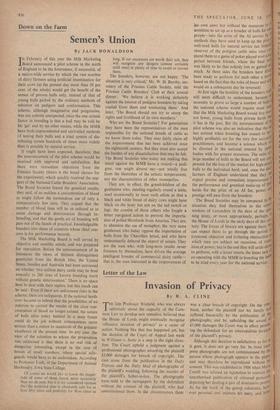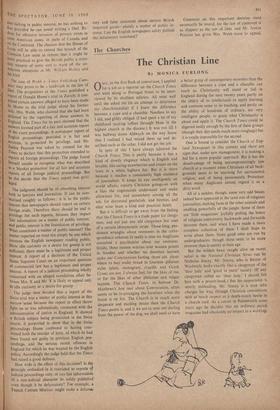Letter of the Law
Invasion of Privacy
By R. A. CLINE THE late Professor Winfield, who was always optimistic about the capacity of the Com- mon Law to develop new remedies, believed that the House of Lords might eventually recognise `offensive invasion of privacy' as a cause of action. Nothing like that has happened yet, but the decision of the Court of Appeal last week in Williams v. Settle is a step in the right direc- tion. The Court upheld a judgment against a professional photographer awarding the plaintiff £1,000 damages for breach of copyright. The case arose from the publication in the Daily Express and the Daily Mail of photographs of the plaintiff's wedding, following the murder of the plaintiff's father-in-law. The photographs were sold to the newspapers by the defendant without the consent of the plaintiff, who had commissioned them. In the circumstances there was a clear breach of copyright. On the other hand, neither the plaintiff nor his family had suffered financially by the publication of Illef photographs, and by upholding the award £1,000 damages the Court was in effect punish' ing the defendant for an unscrupulous invasion of the Plaintiff's privacy.
Although this decision is satisfactory as far 11' it goes, it does not go very far. In most cases press photographs are not commissioned by the person whose photograph appears in the paper' and may therefore be reproduced without consent. This was established in 1906 when Marie Corelli was refused an injunction to restrain Ihe unauthorised publication of coloured postcard depicting her feeding a pair of diminutive As for the work of the gossip columnist, 110- ever personal and intimate his story, and ilov'fr ever lacking in public interest, he has nothing to '_ear provided he can avoid writing a libel. Re- dress for offensive invasion of privacy exists in some American states in parts of Canada and on the Continent. The chances that the House of ;°rds will be able to extend this branch of the Common Law seem so remote that it might be more Practical to give the British public a statu- tory Weapon of some sort to ward off the un- eleo his kinndle. attentions of- Mr William Hickey and the case of Webb v i Ones Publishnig Corn- Pony may prove to be landmark in the law of libel. The proprietors of the lines published a report of Donald Hume's trial in Zurich; it con- tained certain answers alleged to have been made by Hume to the trial judge about his former wife. Mrs. Webb, who claimed that sbe had been defamed by the reporting of those answers in England. The Times for its part claimed that the answers formed part of a fair and accurate report of the court proceedings. A newspaper report of English proceedings, provided it is fair and accurate, is protected by privilege, and Mr. Justice Pearson was asked by counsel for the Times to declare that this protection extended to reports of foreign proceedings. The judge found himself unable to recognise what was described as a 'blanket protection' for all fair and accurate reports of all foreign judicial proceedings. But he did decide that the Times report was privi- leged.
The judgment should be of absorbing interest both to lawyers and journalists. It can be sum- marised roughly as follows: it is in the public interest that newspapers should report on certain foreign trials. Therefore there should be and is Privilege for such reports, because they impart `fair information on a matter of public interest,' and public interest is the foundation of privilege. What constitutes a matter of public interest? The Matter reported on must not simply be one which interests the English newspaper reading public. Mere idle curiosity or a desire for gossip is not sufficient; there must be a legitimate and proper interest. A report of a decision of the United States Supreme Court on an important question of commercial law has a legitimate and proper interest. A report of a judicial proceeding wholly concerned with an alleged scandalous affair be- tween Mrs. X and Mr Y is likely to appeal only to idle curiosity or a desire for gossip.
The judge then decided that a report of the Swiss trial was a matter of public interest in this narrow sense because the report in effect threw light on or was substantially connected with the administration of justice in England. It showed a British subject being prosecuted in the Swiss courts; it purported to show that in the Swiss proceedings Hume confessed to having com- mitted both the murder of Setty, of which he had been found not guilty in previous English pro- ceedings, and the serious recent offences in England for which he was wanted by the English police. Accordingly the judge held that the Times had raised a good defence.
How wide is the effect of this decision? Is the principle embodied in it restricted to reports of judicial proceedings only. or can fair informatidn of a non-judicial character be safely published even though it be defamatory? For example, a French Cabinet Minister might make a defaina-
tory and false statement about certain British imported goods—plainly a matter of public in- terest. Can the English newspapers safely publish the defamatory statement? Comment on this important decision must necessarily be muted. for the law of contempt is as slippery as the law of libel and Mr Justice Pearson has given Mrs. Webb leave to appeal,











































 Previous page
Previous page